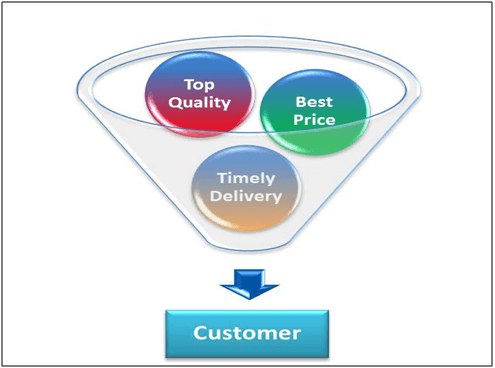The purchasing function can have an overwhelming impact on the bottom line of an organization. The purchasing department helps to maintain the financial health of organizations by procuring goods and services that meet operational needs and keep operations moving smoothly while providing the highest value.
Selecting suppliers is one of the critical aspects of the purchasing department. Any inaccuracy in the supplier selection process can lead to time will be a loss, poor performance, supply disruptions and inefficiencies in the business process.
Failures in supplier selection can be defined in two categories, i.e., quality failures and failures of timing. Quality failures may cause costs to the buying firms, whereas failures of timings come in the form of late deliveries, back orders, variable lead times and incorrect shipments. Frequent changing suppliers can also negatively impact the price, quality of products and lead to stability issues.
Table of Contents
Price, Delivery, and Quality
Unit price should not be the only factor but the total cost of ownership is an important factor. Total ownership not only includes the unit price of the material, but also the labour cost, payment terms, cash discount, logistics cost, maintenance costs and other more qualitative costs that may not be easy to assess.

Price is a very important criterion as it decides the profit amount but the cheapest price may not be the best and best may not be the cheapest.Delivery lead time is another important factor because delivery performance impacts all operations. Failure delivery on time will cause a waste of other resource costs. Quality is the result of the efficiency of the entire operations formed of men, material, and machinery. If quality does not meet the requirements, it will impact the finished product.
Supplier’s Management Capability
Management capability is an important key to the company to manage the company well. Verifying supplier management capabilities is therefore an important factor when selecting suppliers. To measure supplier management capabilities, we need to understand whether the supplier management practices long-range planning, have they committed to total quality management and continuous improvement and how high is the management turnover. Of course, including the educational backgrounds and professional of their key managers, the qualification of leaders can affect the company reputation also including their experience to manage the organization. History of labour and management relations, a good leader will complete with a group of loyal employees to help the company grow. And the supplier organization should prepare to face future competitive challenges and fully understand the importance of strategic sourcing in the market.

Supplier’s Employee Capability
For the company, employees are like an asset to run the whole organization. Hence, the success of a company also depends on the employee’s capabilities. This includes the overall skills and abilities, by sending employees to attend training and courses will keep improving employee’s capability. Worker flexibility, workforce turnover, and willingness of employees contribute to improved operations. Employees and management should have good relations to work towards achieving organizational goals. A company that has good capable employees can create a better quality of the products or services to increase market share and build customer confidence.

Supplier’s Experience
An experienced supplier will keep updating and improving the quality of the products or services to meet the current market trend requirement. From the experiences that the company went through, they will more capable of solving problems and issues. Experience can lead to having better informed, deeper knowledge, awareness sharpener and not to repeat the same mistakes. By choosing an experienced supplier, operational will have lesser problems and smooth productivity. The above shows us how the supplier’s experience can determine procurement success and keep operational smooth.
The full content is only visible to SIPMM members
Already a member? Please Login to continue reading.
References
Chit Ngu Wah Christina, DPSM. (2020). “Essential Criteria to Evaluate Construction Supplier”. Retrieved from: https://publication.sipmm.edu.sg/essential-criteria-evaluate-construction-supplier, accessed 16/03/2020.
Info entrepreneurs. (2020). “Supplier selection process”. Retrieved from https://www.infoentrepreneurs.org/en/guides/supplier-selection-process, accessed 26/03/2020.
Ng Shi Yun, PDPM. (2018). “5 Key Criteria for Supplier Evaluation in the Construction Sector”. Retrieved from: https://publication.sipmm.edu.sg/5-key-criteria-supplier-evaluation-construction-sector, accessed 16/03/2020.
SpendEdge. (2020). “4 Effective Steps to Successful Supplier Selection”. Retrieved from https://www.spendedge.com/blogs/4-effective-steps-successful-supplier-selection, accessed 16/03/2020.

